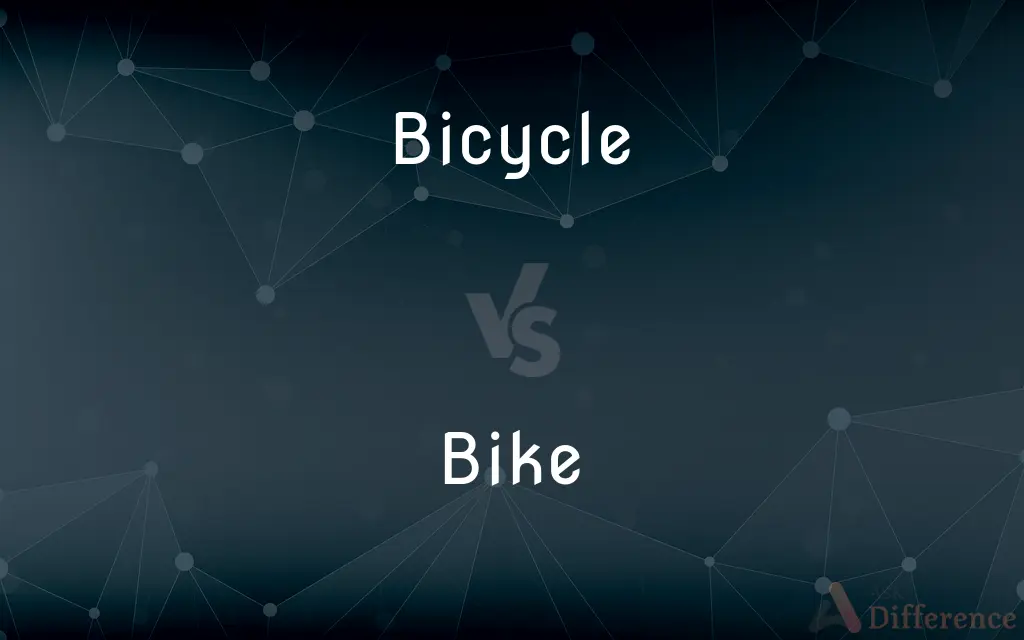Bicycle vs. Bike — What's the Difference?
By Tayyaba Rehman & Fiza Rafique — Updated on March 15, 2024
A bicycle is a human-powered, pedal-driven vehicle with two wheels attached to a frame, while "bike" can refer to both bicycles and motorcycles, varying by context.

Difference Between Bicycle and Bike
Table of Contents
ADVERTISEMENT
Key Differences
A bicycle is specifically designed for human power, featuring pedals, a seat, two wheels, and handlebars for steering. It's primarily used for transportation, recreation, and sport. On the other hand, "bike" is a more versatile term that can refer to a bicycle or a motorcycle, depending on the context. This ambiguity makes "bike" a broader category encompassing both human-powered and motor-powered two-wheeled vehicles.
Bicycles are known for their environmental friendliness, requiring human effort to move and not emitting pollutants. They are a popular choice for those looking to reduce their carbon footprint or engage in physical activity. Whereas, when "bike" is used to refer to motorcycles, it implies a motor-powered vehicle, which can be faster and requires fuel or electricity to operate, thus having a different impact on the environment and not necessarily requiring physical exertion.
In terms of usage, bicycles are widely used around the world for a variety of purposes, including commuting, exercise, and competitive sports like cycling races. "Bike," when referring to bicycles, shares these uses but, when referring to motorcycles, extends to long-distance travel, motor sports, and as a primary mode of transportation in many parts of the world, especially where road conditions or economic factors favor them.
The cultural significance of bicycles and bikes also differs. Bicycles have long been symbols of freedom and simplicity, often associated with childhood or with movements promoting sustainability and health. In contrast, motorcycles (when "bike" is used in this sense) often carry connotations of speed, adventure, and rebellion, embodied in various subcultures and iconic imagery in media and literature.
Regarding ownership and maintenance, bicycles are generally more affordable and easier to maintain than motorcycles. They require no registration, insurance, or license in most jurisdictions, making them accessible to a wider population. On the other hand, owning a motorcycle typically involves additional legal and financial considerations, including licensing, insurance, and more complex maintenance due to their mechanical and electronic systems.
ADVERTISEMENT
Comparison Chart
Definition
A human-powered, pedal-driven vehicle with two wheels.
Can refer to both bicycles and motorcycles, depending on context.
Power Source
Human power through pedaling.
Human power or motor power.
Environmental Impact
Eco-friendly, no emissions.
Varies; bicycles are eco-friendly, motorcycles depend on fuel.
Uses
Commuting, recreation, sports.
Broad, including commuting, sports, long-distance travel.
Cultural Significance
Associated with freedom, simplicity, sustainability.
Varies; can symbolize adventure, rebellion, or practicality.
Ownership Costs
Generally lower, minimal maintenance, no license required.
Varies; motorcycles require more maintenance, insurance, license.
Compare with Definitions
Bicycle
Often used in competitive sports.
He participates in bicycle races to challenge his endurance and speed.
Bike
Motorcycles are included in this category.
His bike can accelerate from 0 to 60 mph in just a few seconds.
Bicycle
Requires human effort to operate.
Bicycling is a great way to incorporate exercise into your routine.
Bike
Associated with various subcultures.
Bike enthusiasts often gather to share their love for two-wheeled adventures, whether it's on a bicycle or motorcycle.
Bicycle
Known for its eco-friendly nature.
Using a bicycle for daily commutes reduces carbon emissions and promotes environmental health.
Bike
Can signify a lifestyle or hobby.
For many, bikes are not just transportation but a way of life.
Bicycle
A vehicle with two wheels, powered by pedaling.
She rides her bicycle to work every day to stay fit and avoid traffic.
Bike
A term referring to both bicycles and motorcycles.
He's always been passionate about bikes, whether pedaling through the mountains or riding a motorcycle on the open road.
Bicycle
Symbolizes simplicity and freedom.
The bicycle has always represented the joy of simple travels and the freedom of movement.
Bike
Usage depends on context.
In the city, I prefer a bicycle, but on the highway, a motorbike is my choice.
Bicycle
A bicycle, also called a bike or cycle, is a human-powered or motor-powered, pedal-driven, single-track vehicle, having two wheels attached to a frame, one behind the other. A bicycle rider is called a cyclist, or bicyclist.
Bike
A bicycle or motorcycle
I'm going by bike
My friends and I would ride our bikes
A bike ride
Bicycle
A vehicle consisting of a light frame mounted on two typically wire-spoked wheels one behind the other and usually having a seat, handlebars for steering, brakes, and two pedals by which it is driven.
Bike
A nest or swarm of bees, wasps, or hornets
They swarmed over him like a bike of wasps
Bicycle
An exercise bicycle.
Bike
Ride a bicycle or motorcycle
Danny bikes to the park and back every day
Bicycle
To ride or travel on a bicycle.
Bike
A bicycle.
Bicycle
A vehicle that has two wheels, one behind the other, a steering handle, and a saddle seat or seats and is usually propelled by the action of a rider’s feet upon pedals.
Bike
A motorcycle.
Bicycle
A traveling block used on a cable in skidding logs.
Bike
A motorbike.
Bicycle
The best possible hand in lowball.
Bike
To ride a bike.
Bicycle
A motorbike.
Bike
Clipping of bicycle
Bicycle
A slut; a promiscuous woman.
Bike
Clipping of motorbike
Bicycle
(climbing) A stabilizing technique in which one foot is pushed down while the other is pulled up.
Bike
Ellipsis of village bike
Bicycle
(ambitransitive) To travel or exercise using a bicycle.
Bike
A hive of bees, or a nest of wasps, hornets, or ants.
Bicycle
To physically ship (a recorded programme) to another broadcasting entity.
Bike
A crowd of people.
Bicycle
A light vehicle having two wheels one behind the other. It has a saddle seat and is propelled by the rider's feet acting on cranks or levers.
Bike
(intransitive) To ride a bike.
I biked so much yesterday that I'm very sore today.
Bicycle
A wheeled vehicle that has two wheels and is moved by foot pedals
Bike
(intransitive) To travel by bike.
It was such a nice day I decided to bike to the store, though it's far enough I usually take my car.
Bicycle
Ride a bicycle
Bike
(transitive) To transport by bicycle.
I biked them the letters.
Bike
A nest of wild bees, wasps, or ants; a swarm.
Bike
A motor vehicle with two wheels and a strong frame
Bike
A wheeled vehicle that has two wheels and is moved by foot pedals
Bike
Ride a bicycle
Common Curiosities
What does "bike" refer to?
"Bike" can refer to both bicycles and motorcycles, with the specific meaning depending on the context.
Can the term "bike" refer to electric bicycles?
Yes, "bike" can also refer to electric bicycles, which are bicycles with an electric motor to assist with pedaling.
What is a bicycle?
A bicycle is a two-wheeled vehicle powered by human pedaling, designed for transportation, recreation, and sports.
How do bicycles and bikes differ in terms of power?
Bicycles are powered by human effort, while "bike" can imply either human-powered or motor-powered vehicles.
How do bicycles and bikes compare in terms of maintenance?
Bicycles generally require less maintenance than motorcycles, which have more complex mechanical and electrical systems.
What cultural significances do bicycles hold?
Bicycles symbolize freedom, simplicity, and a commitment to sustainability and health.
Is a license required to operate a bicycle?
No, operating a bicycle typically does not require a license, unlike motorcycles where a license is necessary.
What factors influence the choice between a bicycle and a bike?
Choices are influenced by factors such as purpose, distance, road conditions, and personal preferences regarding speed and physical activity.
Do bicycles and bikes serve different purposes?
Yes, while there is some overlap, bicycles are often used for shorter, eco-friendly commutes and exercise, whereas bikes, especially motorcycles, are suited for longer distances and specific leisure activities.
Are bicycles environmentally friendly?
Yes, bicycles are environmentally friendly, producing no emissions and requiring human power to operate.
Are bikes used in competitive sports?
Yes, "bikes" can be used in competitive sports, including both bicycle racing and motorcycle racing.
Can "bike" refer to both a mode of transportation and a sport?
Yes, "bike" encompasses both uses, serving as a mode of transportation and as equipment in various sports.
How do legal requirements differ between bicycles and motorcycles?
Motorcycles require registration, insurance, and a valid driver’s license to operate, unlike bicycles.
How does the cost of owning a bicycle compare to a bike?
Owning a bicycle is generally less expensive than owning a motorcycle, considering the costs of fuel, insurance, and maintenance.
What makes bicycles a popular choice worldwide?
Their affordability, minimal environmental impact, and health benefits make bicycles a popular choice globally.
Share Your Discovery

Previous Comparison
Sympathetic vs. Parasympathetic
Next Comparison
Church vs. MinistryAuthor Spotlight
Written by
Tayyaba RehmanTayyaba Rehman is a distinguished writer, currently serving as a primary contributor to askdifference.com. As a researcher in semantics and etymology, Tayyaba's passion for the complexity of languages and their distinctions has found a perfect home on the platform. Tayyaba delves into the intricacies of language, distinguishing between commonly confused words and phrases, thereby providing clarity for readers worldwide.
Co-written by
Fiza RafiqueFiza Rafique is a skilled content writer at AskDifference.com, where she meticulously refines and enhances written pieces. Drawing from her vast editorial expertise, Fiza ensures clarity, accuracy, and precision in every article. Passionate about language, she continually seeks to elevate the quality of content for readers worldwide.















































